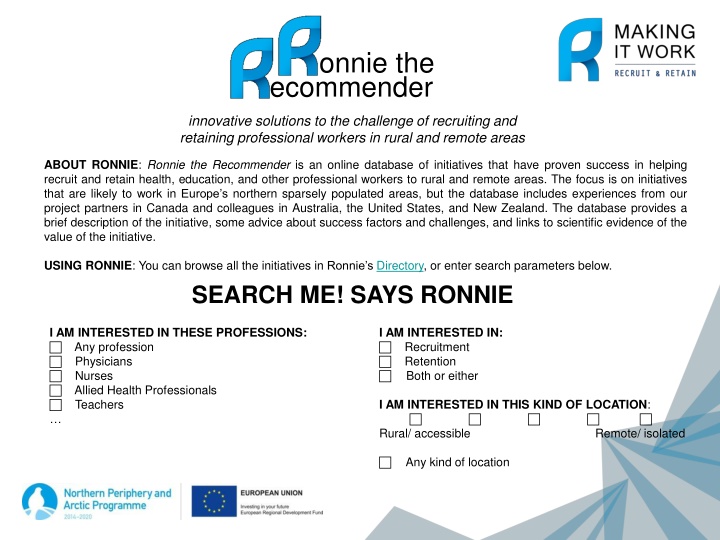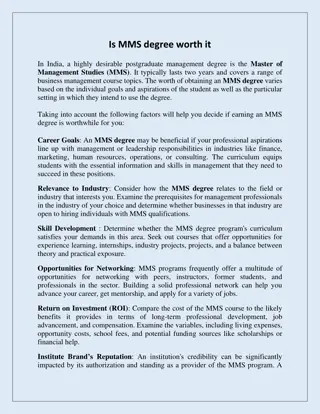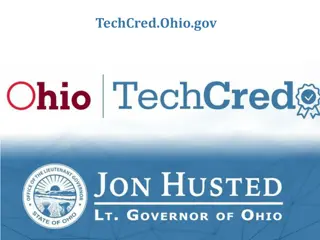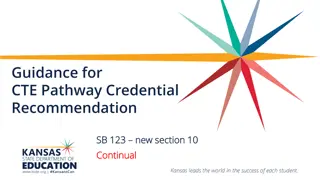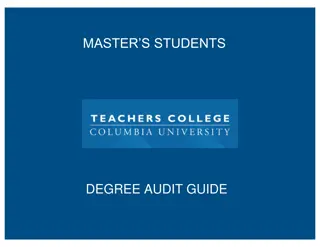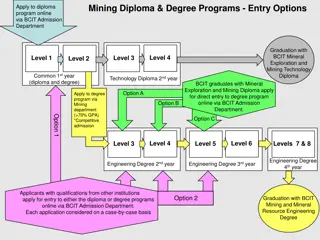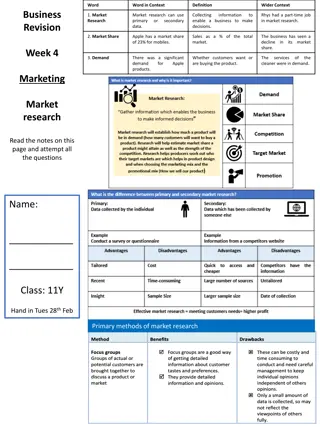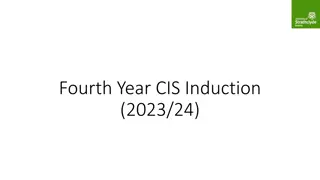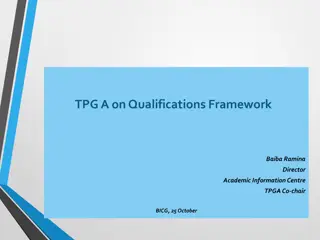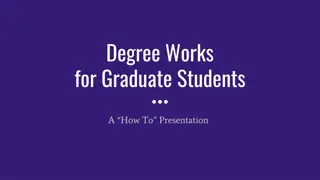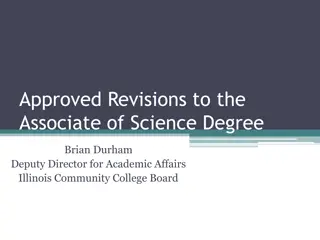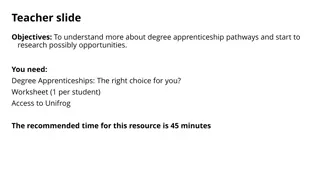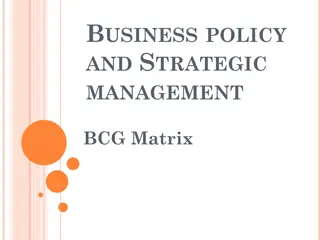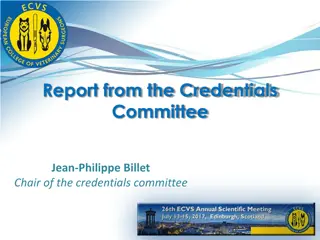Research on Non-degree Credentials: Quality Market Landscape
This research project delves into the quality market landscape of non-degree credentials, focusing on key actors promoting transparency and quality assurance. The study examines influences on the market, including factors such as regulation, norm setting, and consumer perspectives. Through case studies and interviews at various colleges, the project aims to understand the efforts undertaken to enhance the quality of non-degree credential offerings in community colleges across different industries.
Download Presentation

Please find below an Image/Link to download the presentation.
The content on the website is provided AS IS for your information and personal use only. It may not be sold, licensed, or shared on other websites without obtaining consent from the author.If you encounter any issues during the download, it is possible that the publisher has removed the file from their server.
You are allowed to download the files provided on this website for personal or commercial use, subject to the condition that they are used lawfully. All files are the property of their respective owners.
The content on the website is provided AS IS for your information and personal use only. It may not be sold, licensed, or shared on other websites without obtaining consent from the author.
E N D
Presentation Transcript
onnie the ecommender innovative solutions to the challenge of recruiting and retaining professional workers in rural and remote areas ABOUT RONNIE: Ronnie the Recommender is an online database of initiatives that have proven success in helping recruit and retain health, education, and other professional workers to rural and remote areas. The focus is on initiatives that are likely to work in Europe s northern sparsely populated areas, but the database includes experiences from our project partners in Canada and colleagues in Australia, the United States, and New Zealand. The database provides a brief description of the initiative, some advice about success factors and challenges, and links to scientific evidence of the value of the initiative. USING RONNIE: You can browse all the initiatives in Ronnie s Directory, or enter search parameters below. SEARCH ME! SAYS RONNIE I AM INTERESTED IN THESE PROFESSIONS: Any profession Physicians Nurses Allied Health Professionals Teachers I AM INTERESTED IN: Recruitment Retention Both or either I AM INTERESTED IN THIS KIND OF LOCATION: Rural/ accessible Remote/ isolated Any kind of location
Directory Alumni Strategies Summer Scholarships Welcome Activities Accidental Mentoring
ALUMNI STRATEGIES DESCRIPTION: Many people work in or near the places where they spent time as children or during their professional education. Alumni also serve as ambassadors for those places, recommending them to their friends and colleagues. Strategies which involve maintaining contact with previous residents and those who have visited on professional placements can lead to improved recruitment outcomes. Strategies might include a yearly newsletter, or a social media group, or an invitation to an annual alumni function. SUCCESS FACTORS: Research has found that maintaining contact with past residents, and acknowledging their professional achievements can create a sense of goodwill, and even lead to people returning to work in locations that they might not otherwise have considered (Mathews et al, 2012). Success comes from the maintaining of personal and sincere relationships, rather than overt promotion of the location. Success is ultimately dependent on encouraging local youth to consider careers in the professions in local demand, and welcoming visiting students. Alumni strategies can be linked with offers of summer jobs or research scholarships. CHALLENGES: Alumni strategies require long term investment. They may be less successful for locations with poor education infrastructure (both standard and professional education). However, alumni may be recruited from near or distant locations, making these strategies useful for rural and remote locations. Professions: Locations: Recruitment: Retention: Any Yes Yes MAKING IT WORK: Alumni strategies are central to the Making it Work projects in Iceland and Sweden. Swedish team member, Patrik Nilsson says: some vaguely interesting quote about what we are doing and why, or what success we have already had Mathews M, Seguin M, Chowdhury N, Card RT. Generational differences in factors influencing physicians to choose a work location. Rural and Remote Health (Internet) 2012; 12: 1864. Available: http://www.rrh.org.au/articles/subviewnew.asp?ArticleID=1864
SUMMER SCHOLARSHIPS DESCRIPTION: Exposure to rural areas while studying can increase the likelihood of choosing a rural location for professional practice. Even more than that, rural professionals will often choose the exact location where they had student experiences. Locations should therefore try to attract students to visit. One way of doing this is to establish short term summer jobs or scholarships which involve some mix of project work (often research) and clinical exposure. Scholarships provide living expenses and a small salary for 6 or 8 weeks. SUCCESS FACTORS: Scholarships need some level of cooperation between the hosting community (the health service, school, municipality who will supervise the student) and the student s home university (Zorzi et al., 2005). Scholarships work best when there is some formal recognition of their value by the university. Scholarships work best if there are multiple people in the rural location who share the task of supervising the student. Attention should also be paid to engaging the student in the social life of the location. CHALLENGES: For hands on professions such as health and education, it may be difficult experiences during summer holiday periods because the host practitioners are on leave, or schools or particular health programs are closed. Clinical exposure preparedness of the student and host to undertake practical work. to provide interesting practical Professions: Locations: Recruitment: Retention: Any also needs to consider the Yes No MAKING IT WORK: The Northern Ontario School of Medicine offers a summer Medical Student Research Award. Some person in a host community says I really like it, and we think the key to success is keeping in touch with the student after the project is finished. Zorzi A, Rourke J, Kennard M, Peterson M, Miller K. Combined research and clinical learning make rural summer studentship program a successful model. Rural and Remote Health (Internet) 2005; 5: 401. Available: http://www.rrh.org.au/articles/subviewnew.asp?ArticleID=401
WELCOME ACTIVITIES DESCRIPTION: A study of dentists in the Northern Territory of Australia (Hall et al., 200/) found that the main predictor of leaving the area within the first five years was a lack of social ties. Newcomers often find it difficult to become part of social activities in which they already have an interest, or to find out if they might be interested in new activities. Organising a welcome function which includes some of the activities you know the new person is interested in can help establish social ties. SUCCESS FACTORS: Welcome activities work best if they fit with the newcomer s existing interests, but should also offer opportunities to develop new interests. It also needs to be clear that these activities are specifically for the newcomer, or the newcomer is especially welcome, rather than simply being invitations to things that already happen. CHALLENGES: In regions with high staff turnover, it may become tiring to be constantly welcoming new staff. A program of activities throughout the year may be easier to manage locally. Be careful not to over-promise on activities that are not normally available in the community Professions: Locations: Recruitment: Retention: Any No Yes MAKING IT WORK: The Centre for Rural Medicine in Storuman held a staff activity to bake special bread for Christmas. As a newcomer, I was not invited, even though I like baking. So I am quitting. But I noticed that they did invite my new students to a staff birthday party but they still didn t invite me. Maybe its my fault? Hall DJ, Garnett ST, Barnes T, Stevens M. Drivers of professional mobility in the Northern Territory: dental professionals. Rural and Remote Health (Internet) 2007; 7: 655. Available: http://www.rrh.org.au/articles/subviewnew.asp?ArticleID=655 Rohatinsky NK, Jahner S. Supporting nurses transition to rural healthcare environments through mentorship. Rural and Remote Health (Internet) 2016; 16: 3637. Available: http://www.rrh.org.au/articles/subviewnew.asp?ArticleID=3637
ACCIDENTAL MENTORING DESCRIPTION: Formal mentoring programs can be effective in reducing professional isolation, but, particularly in small organisations, they can place a high burden on a few more experienced people to look after new and more junior staff. Accidental mentoring occurs when a more experienced person provides support around a particular short-term problem without a formal request from the organisation to do so. Accidental mentoring can be as simple as a five or ten minute conversation. SUCCESS FACTORS: Less experienced staff need to feel confident that they can approach their colleagues for advice. Mentors need to feel that they are not responsible for all junior staff. A workplace culture which encourages mutual support and acknowledges mentoring incidents will be most successful. CHALLENGES: Management needs to recognise the value of these interactions between staff, and allow time in the work schedule for staff to reflect and engage in this way. Smaller organisations may find accidental mentoring as difficult as formal mentoring if there are few experienced workers. Professions: Nursing, teaching Locations: Recruitment: Retention: Yes No MAKING IT WORK: Somebody tries to facilitate something similar maybe having irregular (or regular) small group meetings after crisis incidents, providing opportunities for people to have these short term exchanges. Mills JE, Francis K, Bonner A. The accidental mentor: Australian rural nurses developing supportive relationships in the workplace. Rural and Remote Health (Internet) 2007; 7: 842. Available: http://www.rrh.org.au/articles/subviewnew.asp?ArticleID=842
Other solutions Welcome pack Exit interviews Flexible work location Staged exit for older workers Digital technologies High visibility research Staff exchange Customised job design High school promotions City rotation Online chats Professional networks Marketing orientation Let young workers leave Know your R&R context Scholarly pursuits Formal mentoring Annual staff survey
Ronnies next steps adopt a solution ? Each partner takes some solutions and adds the Making it Work bit? Either their own comments or testimonials from a real person. And a picture. Takes on the task on developing a few of the 39 from the booklet? Not all that happy with the search parameters but does that matter too much? Searching by some of the context statements might be better but harder to develop What about identifying the professions it might work for? Do we make our own assessment, or just list the professions which have been actually tested?
